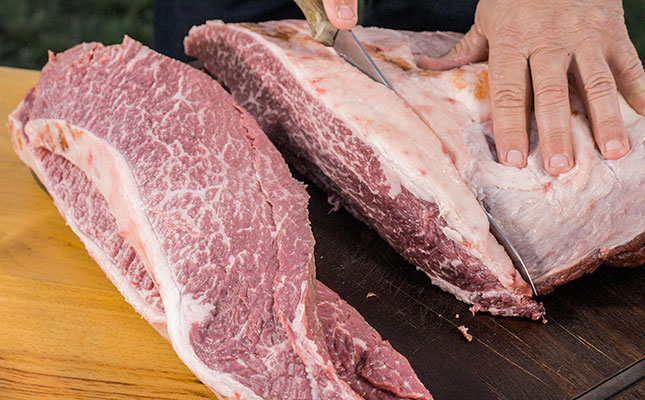
Photo: Woodview Professional Genetics
Wagyu beef is a “curve bender” in terms of fatty acid composition, and the breed has the ability to actually change the way fatty acids are manufactured in an animal’s body.
This was according to Prof Dale Woerner, an associate professor of meat science at the Texas Tech University in Lubbock in the US, who was speaking at the 2019 Wagyu Conference held at Nampo Park near Bothaville last Friday.
Woerner said fatty acids were the building blocks of fat, and an increase in fatty acids increased the flavour and desirability of meat.
However, there was no doubt that its fatty acid composition made Wagyu beef a unique product, Woerner said.
“All factors such as enzymes and glucose levels considered, Wagyu beef is the perfect storm. However, genetics are vital. No amount of feeding can supersede genetics and that is why high genetic standards in the breeding of Wagyu cattle are so important.”
Woerner said the predominant fat in beef consisted of monounsaturated fatty acids, and added that it was a well-established fact that these fatty acids were “heart health”.
The fatty acids in Wagyu beef were, among other elements, high in oleic acid, which was a common monounsaturated fat in the human diet, he said.
It had been associated with a decrease in low-density lipoprotein (LDL) cholesterol and a possible increase in high-density (HDL) cholesterol. HDL was known as “good cholesterol”, as it transported cholesterol to the liver to be expelled from the body.
HDL helped rid the body of excess cholesterol so it was less likely to end up in a person’s arteries, he explained.
Wagyu beef’s high levels of palmitic fatty acids, in combination with the oleic acids, added to the buttery and nutlike taste of Wagyu beef, he said.
Woerner added that these two fatty acids produced volatile aromatic compounds during cooking, which were responsible for the “unsurpassed” taste of Wagyu beef.













